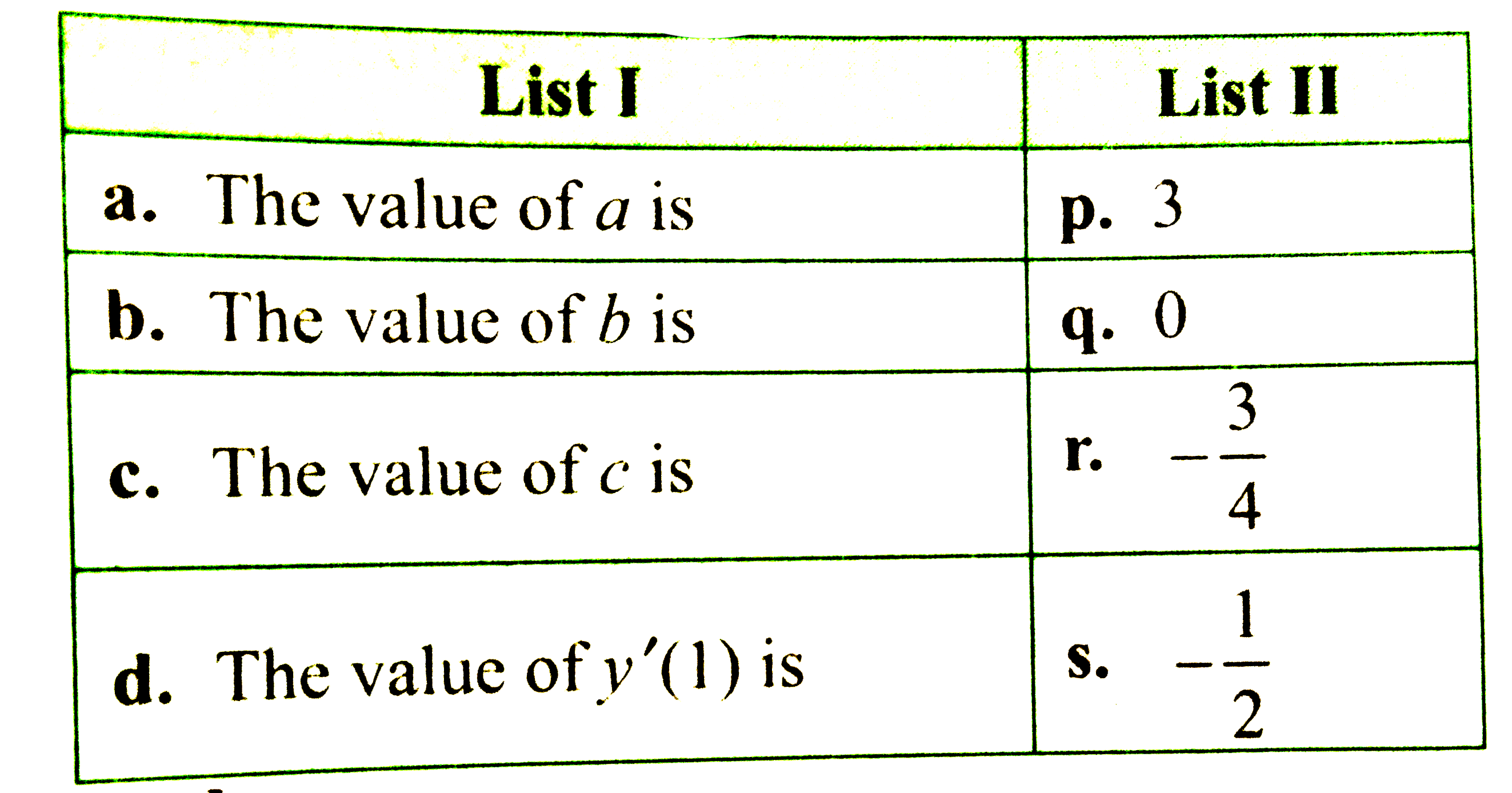If the curve y=ax3+bx2+cx is inclined at 45∘ to x-axis at (0, 0) but touches x-axis at (1, 0) , then
a= 1, b = -2, c = 1
a = 1, b = 1, c = -2
a = -2, b = 1, c = 1
a = -1, b = 2, c = 1
The correct Answer is:A
To solve the problem step by step, we will analyze the conditions given for the curve y=ax3+bx2+cx.
Step 1: Understand the conditions
The curve is inclined at 45∘ to the x-axis at the point (0,0). This means that the slope of the curve at this point is 1 (since tan(45∘)=1).
Step 2: Find the derivative of the curve
To find the slope of the curve, we differentiate y with respect to x:
dydx=3ax2+2bx+c
Step 3: Evaluate the slope at (0,0)
Substituting x=0 into the derivative:
dydx∣∣∣(0,0)=3a(0)2+2b(0)+c=c
Since the slope at (0,0) is 1, we have:
c=1
Step 4: Use the second condition (touching the x-axis at (1,0))
The curve touches the x-axis at (1,0). This means:
1. The point (1,0) lies on the curve.
2. The slope of the curve at this point is 0.
Step 5: Substitute (1,0) into the curve equation
Substituting x=1 and y=0 into the curve equation:
0=a(1)3+b(1)2+c(1)
Substituting c=1:
0=a+b+1
This gives us the first equation:
a+b+1=0(Equation 1)
Step 6: Find the slope at (1,0)
Now, we need to find the slope at x=1:
dydx∣∣∣(1,0)=3a(1)2+2b(1)+c
Substituting c=1:
dydx∣∣∣(1,0)=3a+2b+1
Since the slope at this point is 0:
3a+2b+1=0(Equation 2)
Step 7: Solve the system of equations
Now we have two equations:
1. a+b+1=0
2. 3a+2b+1=0
From Equation 1, we can express b in terms of a:
b=−1−a
Substituting b into Equation 2:
3a+2(−1−a)+1=0
Simplifying:
3a−2−2a+1=0
a−1=0⟹a=1
Step 8: Find b
Now substituting a=1 back into Equation 1:
1+b+1=0⟹b=−2
Step 9: Summary of values
We have found:
- a=1
- b=−2
- c=1
Final Answer
The values of a, b, and c are:
a=1,b=−2,c=1
The curve is inclined at 45∘ to the x-axis at the point (0,0). This means that the slope of the curve at this point is 1 (since tan(45∘)=1).
To find the slope of the curve, we differentiate y with respect to x:
dydx=3ax2+2bx+c
Substituting x=0 into the derivative:
dydx∣∣∣(0,0)=3a(0)2+2b(0)+c=c
Since the slope at (0,0) is 1, we have:
c=1
The curve touches the x-axis at (1,0). This means:
1. The point (1,0) lies on the curve.
2. The slope of the curve at this point is 0.
Substituting x=1 and y=0 into the curve equation:
0=a(1)3+b(1)2+c(1)
Substituting c=1:
0=a+b+1
This gives us the first equation:
a+b+1=0(Equation 1)
Now, we need to find the slope at x=1:
dydx∣∣∣(1,0)=3a(1)2+2b(1)+c
Substituting c=1:
dydx∣∣∣(1,0)=3a+2b+1
Since the slope at this point is 0:
3a+2b+1=0(Equation 2)
Now we have two equations:
1. a+b+1=0
2. 3a+2b+1=0
b=−1−a
3a+2(−1−a)+1=0
Simplifying:
3a−2−2a+1=0
a−1=0⟹a=1
Now substituting a=1 back into Equation 1:
1+b+1=0⟹b=−2
We have found:
- a=1
- b=−2
- c=1
The values of a, b, and c are:
a=1,b=−2,c=1
Topper's Solved these Questions
- TANGENTS AND NORMALSBOOK - OBJECTIVE RD SHARMA ENGLISHCHAPTER - TANGENTS AND NORMALSEXERCISE - Exercise
42 Videos
- SOLUTIONS OF TRIANGLES BOOK - OBJECTIVE RD SHARMA ENGLISHCHAPTER - SOLUTIONS OF TRIANGLES EXERCISE - Exercise
20 Videos
- THREE DIMENSIONAL COORDINATE SYSTEM BOOK - OBJECTIVE RD SHARMA ENGLISHCHAPTER - THREE DIMENSIONAL COORDINATE SYSTEM EXERCISE - Exercise
20 Videos
Similar Questions
The curve y=ax3+bx2+cx is inclined at 45∘ to x-axis at (0,0) but it touches x-axis at (1,0) , then a+b+c+10 is
View SolutionThe curve y=ax2+bx2+cx+5 touches the x-axis at P(−2,0) and cuts the y-axis at point Q, where its gradient is 3. Now, match the following lists and then choose the correct code.

View Solution
Knowledge Check
The tangent to the curve y=e2x at (0,1) meets the x-axis at
A(0,1)B(−12,0)C(2,0)D(0,2)
The curve y=ax3+bx2+cx+5 touches the x-axis at P(−2,0) and cuts the y-axis at the point Q where its gradient is 3. Find the equation of the curve completely.
View SolutionThe curve y=ax3+bx2+cx+5 touches the x-axis at P(−2,0) and cuts the y-axis at the point Q where its gradient is 3. Find the equation of the curve completely.
View SolutionThe curve y=ax3+bx2+cx+5 touches the x-axis at P(−2, 0) and cuts the y-axis at the point Q where its gradient is 3. Find the equation of the curve completely.
View SolutionPoints on the curve f(x)=x1−x2 where the tangent is inclined at an angle of π4 to the x-axis are (a) (0,0) (b) (√3,−√32) (c) (−2,23) (d) (−√3,√32)
View SolutionIf the tangent to the curve xy+ax+by=0 at (1,1) is inclined at an angle tan−12 with x-axis, then find aandb?
View SolutionIf the tangent to the curve xy+ax+by=0 at (1,1) is inclined at an angle tan−12 with x-axis, then find aandb?
View SolutionIf the curve y=ax2+bx+c passes through the point (1, 2) and the line y = x touches it at the origin, then
View Solution
